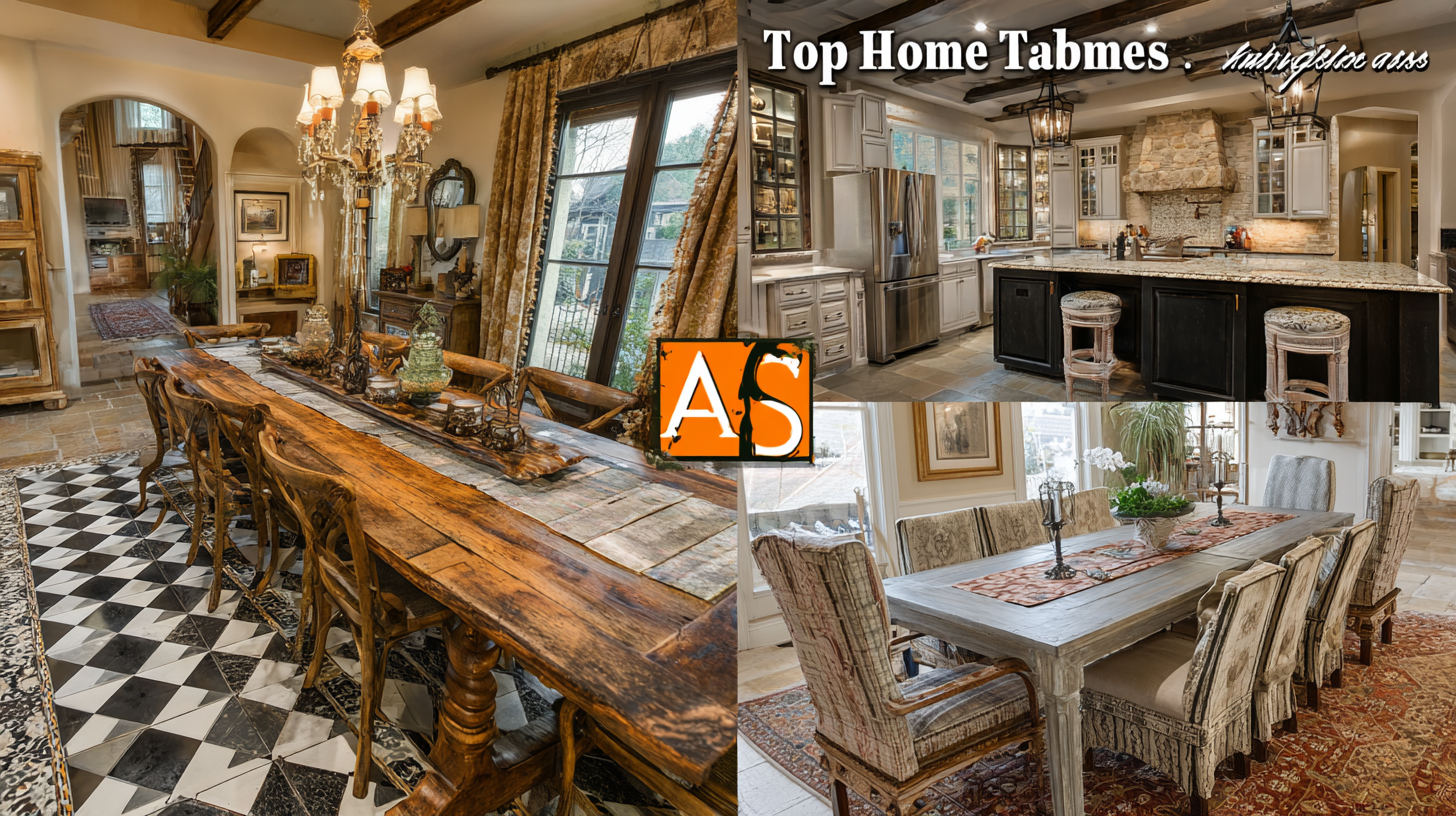Top 5 Home Tables Compared: Which One Truly Fits Your Lifestyle?
In today's fast-paced world, selecting the perfect table for home has become an essential consideration for many individuals and families. According to a recent survey by the National Retail Federation, furniture sales have surged by 15% over the past year, highlighting the growing importance of well-designed living spaces. A table serves as more than just a functional piece of furniture; it plays a pivotal role in family gatherings, work-from-home setups, and social interactions. Moreover, recent industry reports indicate that 65% of consumers prioritize versatility and style when choosing a table, reflecting a shift in lifestyle preferences towards multi-functional spaces. With numerous options available on the market, this blog delves into a comparative analysis of the top five home tables, helping you identify which one truly aligns with your lifestyle needs.

Understanding Different Types of Home Tables: A Comprehensive Overview
Home tables come in various shapes, styles, and functions, each catering to unique lifestyles and preferences. From dining tables that serve as the heart of gatherings to coffee tables that anchor living spaces, understanding the different types of home tables is essential. A dining table, often the centerpiece of family meals, varies in size and design, ranging from rustic farmhouse styles to sleek modern options. Meanwhile, side tables offer versatility in living rooms and bedrooms, providing convenient surfaces for lamps, books, and decor without taking up too much space.
Moreover, console tables and desk tables serve distinct purposes that can enhance the functionality of a home. Console tables, typically slim and long, are perfect for entryways, adding aesthetic appeal while allowing for practical storage of keys or other essentials. On the other hand, desk tables are designed for productivity, providing a dedicated workspace in today’s increasingly remote world. Understanding these categories not only helps in choosing the right table but also ensures that your selection aligns harmoniously with your lifestyle and the overall decor of your home.

Choosing the Right Table Material for Durability and Style
When it comes to selecting the perfect home table, the material choice plays a crucial role in both durability and style. According to a report by the Furniture Today, nearly 60% of consumers prioritize material quality when making a furniture purchase. This statistic underscores the importance of understanding the benefits and drawbacks of various materials available on the market.
Wood, for instance, remains a timeless option, offering both strength and aesthetic appeal. Hardwoods like oak and maple are reported to have a lifespan of over 20 years with proper care, making them ideal for families and those seeking investment pieces. On the other hand, materials such as glass and metal provide a more modern touch while still maintaining durability. Recent trends indicated that 45% of homeowners are opting for glass tables due to their ability to blend seamlessly into various decor styles, offering a chic and airy feel.
Additionally, composite materials are gaining traction among younger buyers, as they combine affordability with style. A survey by the National Furniture Association found that 30% of millennial customers prefer tables made from engineered wood due to their versatility and lesser environmental impact. Ultimately, selecting the right table material not only enhances your living space but also aligns with your lifestyle preferences and longevity expectations.
Top 5 Home Tables Material Comparison
Exploring Size and Shape: Finding the Perfect Fit for Your Space
When selecting the ideal home table, size and shape are pivotal factors that can transform your living space. A table should not only complement your décor but also fit seamlessly into your daily routine. Start by measuring the area where you plan to place the table. Ensure there's enough space around it for movement and accessibility. For smaller rooms, consider round tables, which can facilitate easier movement and make the area feel less cramped. In contrast, rectangular tables work well in larger dining rooms or open concept spaces, providing a more formal look and accommodating more guests.
Tips: Remember to account for the height of your table in relation to your chairs. A comfortable dining experience usually involves a gap of 10-12 inches between the seat and the tabletop. Additionally, think about the table's purpose—if it's for casual gatherings, a larger, more robust table may work best, while a sleek, smaller table could suit a workspace or breakfast nook. Finally, consider how the shape of your table interacts with the rest of your furniture; round tables can soften angular rooms, while a long, rectangular table can create a striking focal point in an elongated space.
Functional Features to Consider: Storage, Mobility, and Versatility
When choosing the perfect home table, it's essential to consider its functional features. Storage, mobility, and versatility can significantly impact how effectively a table serves your lifestyle. For those with limited space, a table with built-in storage compartments can be a game-changer. Look for options that offer drawers or shelves beneath the tabletop, allowing you to keep essential items close at hand while minimizing clutter.
Mobility is another critical factor to consider. If you frequently rearrange your living space or host gatherings, a lightweight, easily movable table can provide the flexibility you need. Tables with wheels or foldable designs offer a practical solution, enabling you to adapt your layout effortlessly.
Finally, versatility ensures that your table meets various needs over time. A table that can seamlessly transition from a dining setting to a workspace or craft area will maximize its utility. Opt for adjustable-height tables or those with multifunctional designs to get the most out of your investment. Keeping these features in mind will help you find a table that enhances your living experience while fitting your unique lifestyle.
How Lifestyle Influences Table Selection: Tailoring Choices to Your Needs
When selecting a home table, understanding how your lifestyle influences your choices is crucial. According to the National Kitchen and Bath Association (NKBA), nearly 60% of homeowners prioritize functionality over aesthetics when purchasing furniture. This underscores the importance of matching a table to the specific needs of daily life—not just its visual appeal. For example, a small, intimate dining table may suit a couple in a cozy apartment, whereas a larger, extendable table could better serve a family that enjoys hosting gatherings.

Moreover, lifestyle factors such as the frequency of entertaining, work-from-home setups, and overall household dynamics play a significant role in selection. A recent report by Furniture Today noted that 40% of consumers cite the need for versatile furniture that can adapt to various activities—be it dining, working, or socializing. This blend of functionality and adaptability means a farmhouse-style table with ample storage can be ideal for a busy family, while a sleek glass top could be perfect for minimalists who favor a more open space.
Ultimately, the right table not only fulfills practical requirements but also enhances the way you live and interact in your home.
